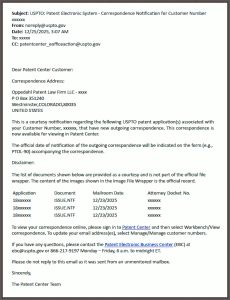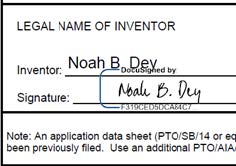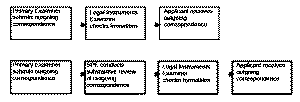Hello listserv colleagues! I think the listservs are more or less back in service. But for about 30% of our listserv members, the member’s email service provider (ESP) is blocking our postings as spam. If you are in that 30%, I urge you to direct your ESP to stop the blocking. This may include whitelisting the new IP address or speaking frankly with your ESP.
And if you posted anything to any of the listservs since about December 21, I am sorry to say you will probably need to repost it.
It took a lot of my professional time to deal with this. And the hosting service will cost a bit more in perpetuity. I will gladly receive donations to help support this, as detailed below.
Details follow. Continue reading “Listservs seem to be back in service”


 On March 22, 2024 the USPTO published a Federal Register Notice saying that the USPTO would start accepting electronic signatures generated by some commercial e-signature platforms without any requirement that virgules (forward slashes) be incorporated into the e-signature. You can see, at right, an e-signature generated by one particular commercial e-signature platform. If you were to e-file the document quoted at right, would the USPTO bounce it or accept it? In this blog article I discuss in detail the various USPTO communications to try to work out the answer. Spoiler alert — it turns out to be impossible to know what the USPTO will and will not accept. Bigger spoiler alert — one assumes that TYFNIL this will be a fertile area for summary judgment practice and the like.
On March 22, 2024 the USPTO published a Federal Register Notice saying that the USPTO would start accepting electronic signatures generated by some commercial e-signature platforms without any requirement that virgules (forward slashes) be incorporated into the e-signature. You can see, at right, an e-signature generated by one particular commercial e-signature platform. If you were to e-file the document quoted at right, would the USPTO bounce it or accept it? In this blog article I discuss in detail the various USPTO communications to try to work out the answer. Spoiler alert — it turns out to be impossible to know what the USPTO will and will not accept. Bigger spoiler alert — one assumes that TYFNIL this will be a fertile area for summary judgment practice and the like. 